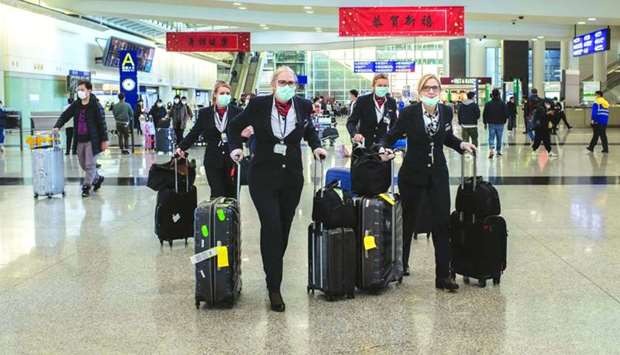Beyond the Tarmac – Aviation Page
With novel coronavirus outbreak disrupting global travel industry, airline revenues are likely to fall by $4bn to $5bn in the first quarter of this year.
Recently, the International Civil Aviation Organisation (ICAO) reported that while 50 airlines have significantly cut back operations, 70 others have fully cancelled all international flights to and from mainland China.
This has resulted in an 80% reduction of foreign airline capacity for travellers to and from China, as well as a 40% capacity reduction by Chinese airlines.
The projected hit to global airline revenues will be from a nearly 40% overall reduction in passenger capacity in the first quarter — almost 20mn passengers less than what airlines had projected earlier.
Obviously, when travel restrictions are imposed due to contagious outbreaks, the demand for air travel falls.
Many governments have already placed travel curbs, cautioning people against travelling to the virus affected regions in China and South East Asia.
The Montreal-based UN agency warned that the coronavirus would have a greater impact on the aviation industry than even the 2003 Sars epidemic.
The global aviation sector’s losses from the 2003 Sars outbreak were believed to be have been in excess of $10bn.
The possible costs to the aviation industry due to coronavirus will be much higher, as it spreads faster and also because the aviation sector's volume is much higher now than it was some 17 years ago.
In particular, air cargo will take a blow, as production will be disrupted due to people being quarantined at many business hubs.
Worse still, the government-imposed factory closures in China have already disrupted the aerospace supply chain, globally.
It may be many weeks, if not months, for the Chinese industry to get back to normal operations should the spread of the deadly virus is effectively contained.
The widespread cuts to scheduled airline service in China and multiple travel restrictions imposed by governments around the world have raised concerns that the effect of the novel coronavirus outbreak on the air transport sector could prove more severe than the one resulting from the Sars epidemic in 2003.
Until Wednesday, the novel coronavirus had killed more than 2,000 people, all but six of them in mainland China. It has infected more than 75,000 people, with more than 1,000 cases outside mainland China.
Some scientists say the virus, which originated in Wuhan, Central China, is more contagious than the related coronaviruses that caused severe acute respiratory syndrome (Sars) and Middle East respiratory syndrome (Mers).
While the resulting disease, COVID-19, is not as fatal on a case-by-case basis, its quick spread has meant it has killed more people already than either of the other viruses.
Findings from OAG, a firm that analyses global airline schedules, the coronavirus has resulted in an unprecedented reduction in international air traffic over the past few weeks, with two-thirds of international flights from China now cancelled.
Out of all the countries facing steep declines in airline travel, Japan has lost the most, losing 16% of its total international flight capacity in recent weeks, international publication Forbes said quoting OAG. That’s because of 200,000 fewer direct flight seats — about 60% of all traffic between Japan and China, being affected.
Despite concerns over the impact such measures will have on air travel, recent IATA analysis suggests that airlines will weather the storm in the long term.
“In the past, the airline industry has proven resilient to shocks, including pandemics,” points out IATA, the trade association for the world’s airlines.
“Even in the outbreak of Sars, monthly international passenger traffic returned to its pre-crisis level within nine months.”
While global passenger traffic returned to pre-crisis level within nine months after Sars, the 2005 and 2013 bird flu crisis had a “much milder and short-lived” impact as air travel “rebounded quickly” once fears over the global spreading of the virus had lessened.
As the situation continues to evolve rapidly, day-by-day, collaboration between states and industries — in particular those facilitating the movement of goods and people — is vital in the battle to contain the virus, IATA said.
China accounts for nearly 16% of global airline capacity, and if the current trend continues, this is likely to drop by 8%, an analysis showed.
Therefore, coronavirus has the potential to fundamentally impair 2020's global airline capacity growth.
*Pratap John is Business Editor at Gulf Times.


